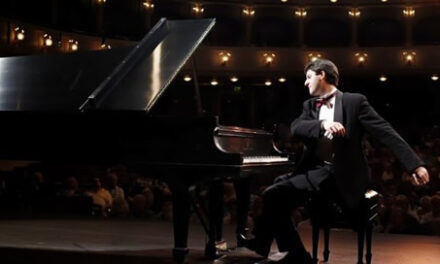Say what you will about those Ag. and Engineering folks at NC State, they sure know how to throw high-class parties with music! On a very busy Sunday afternoon, with lots of artistic competition in the Triangle, Music Director and Conductor Randolph Foy led the 31 or so artists of the Raleigh Civic Chamber Orchestra in a little festival concert that celebrated the ensemble’s creation ten years ago and its subsequent growth as well. On the program were two works essayed in 1997: Prokofiev’s Overture on Hebrew Themes and Debussy’s Petite Suite (as orchestrated by Henri Büsser). These little gems were given fine readings, and although the Overture seemed to get off to a slow start, both were polished, nicely balanced, and incisively played, reflecting ever-more-solid ensemble within this splendid little orchestra.
The program included two newer works as well: the Sinfonietta “La Jolla” (1950) by Bohuslav Martinu and the world premiere of “Finzione de Interludio” (“Fiction of an Interlude,” after Fernando Pessoa) by Marco Buongiorno Nardelli (b.1963), who earns a living as an associate professor of physics at NCSU, and whose musical output includes some very attractive pieces for wind instruments and electronics.
The charming Prokofiev score need not long detain us. It’s a somewhat episodic piece that became increasingly animated as it unfolded.
The new score suggested old Italian concerto grosso forms in new attire, liberally spiced, as woodwinds played solo or in small groups and were answered by all the musicians, alternately. As the music progressed it was apparent that there is a healthy infusion of variation on two principal themes in the score as well. Proper classical people tend to take themselves and what they listen to seriously, but Foy explained it’s ok to enjoy this music – and to laugh, too; and one child did so at an ideal moment of silence, prompting guffaws all around. The tuttis were enlivened toward the end by (presumably wordless) chatter from the players, and the main themes came back, deftly entwined. This was much more than a reading – the music was clearly well-served, and it made a very favorable impression on the audience.
The story behind “Finzione,” a good deal more complex than the music itself, was outlined in an excellent program note by the composer, set amid accounts of the other scores by Foy himself.
The Debussy is utterly charming, and it’s a tribute to the RCCO and Foy that it was so nicely realized.
But the delight and the treasure of the afternoon, too, was the Martinu Sinfonietta, written for an orchestra in the California town cited in the title. We hear too little Martinu, and that means we’re missing a lot of superb music. Foy’s selection of this handsome work is yet another feather in his programming cap – he’s one of our most innovative and imaginative leaders, as the ten-year repertoire list printed in the program makes abundantly clear!
At the outset, Foy made brief congratulatory remarks, among other things recognizing ten-year RCCO veteran Ted Wagner, a violinist. There are some distinguished musicians in this group, including particularly strong woodwind and brass players, many of whom were heard to good advantage during the afternoon. Guest ensemble pianist Nancy Whelan made many wonderful contributions in the Martinu, especially, and guest harpist Winifred Garrett graced the Debussy with her admirable skills.











